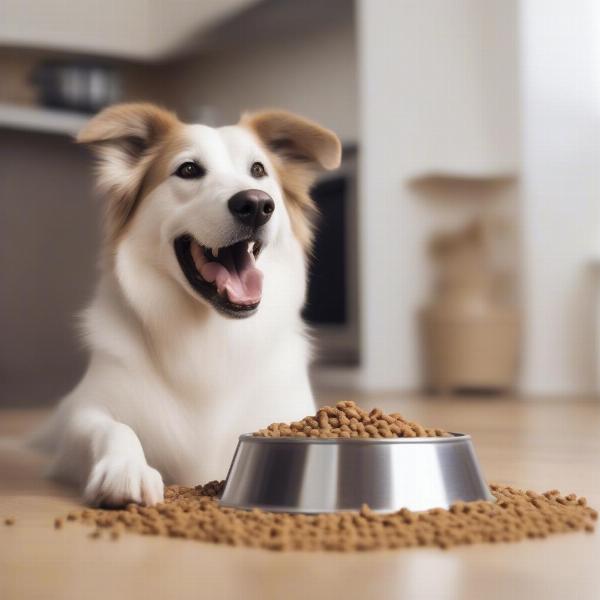Choosing the right dog food can be overwhelming, especially when considering dietary restrictions like low-fat content. Good low-fat dog food is crucial for dogs prone to pancreatitis, obesity, or other health issues requiring fat restriction. This article will guide you through everything you need to know about selecting and incorporating low-fat dog food into your canine companion’s diet.
Understanding the Need for Low-Fat Dog Food
Why is low-fat dog food important for some dogs? Certain breeds and individual dogs are predisposed to pancreatitis, a painful inflammation of the pancreas. High-fat diets can trigger or exacerbate this condition. Additionally, overweight dogs often benefit from a low-fat diet to help them shed extra pounds and improve overall health.
Identifying Dogs That Need a Low-Fat Diet
Which dogs need a low-fat diet? Breeds like Schnauzers and Cocker Spaniels are genetically more susceptible to pancreatitis. Senior dogs, dogs with hyperlipidemia (high blood lipids), and those recovering from gastrointestinal surgery might also require low-fat food. Your veterinarian can diagnose and recommend the appropriate diet for your dog’s specific needs.
Choosing the Right Low-Fat Dog Food
Navigating the pet food aisle can feel like a minefield. Look for dog foods labeled “low-fat” or “light.” Check the guaranteed analysis on the label; low-fat dog food generally contains less than 10% fat on a dry matter basis.
Reading Dog Food Labels
How do you decipher dog food labels? The guaranteed analysis provides minimum and maximum levels of nutrients. Focus on the fat percentage and look for high-quality protein sources. Avoid fillers and artificial ingredients.
Ingredients to Look For and Avoid
What ingredients are beneficial or harmful in low-fat dog food? Look for lean protein sources like chicken, turkey, or fish. Fiber-rich ingredients like brown rice and vegetables can aid in weight management. Avoid high-fat meats like beef and pork, as well as added fats and oils.
Transitioning to Low-Fat Dog Food
Introducing a new food should be gradual to avoid digestive upset. Start by mixing a small amount of the low-fat food with your dog’s current food. Gradually increase the proportion of low-fat food over several days until the transition is complete.
Monitoring Your Dog’s Response
How do you know if your dog is adjusting well to the new food? Monitor your dog’s stool consistency, appetite, and energy levels. Consult your veterinarian if you notice any adverse reactions or concerns.  A healthy dog eating low-fat dog food from a bowl
A healthy dog eating low-fat dog food from a bowl
Conclusion
Good low-fat dog food can significantly improve the health and well-being of dogs with specific dietary needs. By understanding the importance of low-fat diets, learning how to choose the right food, and transitioning carefully, you can help your dog thrive. Always consult with your veterinarian to determine the best low-fat dietary plan for your furry friend.
FAQ
- What is the ideal fat percentage for low-fat dog food? Generally, less than 10% fat on a dry matter basis is considered low-fat.
- Can all dogs eat low-fat dog food? No, only dogs with specific dietary needs, like pancreatitis or obesity, should eat low-fat food.
- What are some signs of pancreatitis in dogs? Vomiting, diarrhea, lethargy, abdominal pain, and decreased appetite are common signs.
- How long does it take to transition a dog to a new food? A gradual transition over 7-10 days is usually recommended.
- What should I do if my dog doesn’t like the new low-fat food? Try mixing it with a small amount of their previous food or warming it up slightly. If the problem persists, consult your veterinarian.
- Can low-fat dog food help with weight loss? Yes, reducing dietary fat can contribute to weight loss in overweight dogs.
- Are there homemade low-fat dog food options? Yes, but it’s crucial to consult with a veterinary nutritionist to ensure a balanced diet.
ILM Dog is a leading international website dedicated to providing expert advice and resources for dog owners worldwide. We offer comprehensive information on dog breeds, health, training, nutrition, grooming, and much more. Whether you’re a seasoned dog owner or just starting your journey, ILM Dog is here to support you every step of the way. Contact us at [email protected] or +44 20-3965-8624 for personalized guidance and support. Visit ILM Dog for more valuable insights on dog care and nutrition. We specialize in helping you find the best products and solutions for your canine companion, including information on dog teddy bear, hills dog food, and low carbohydrate dog food. For those in the UK looking for supplements, we also have resources on fish oil for dogs uk and dog krill oil.